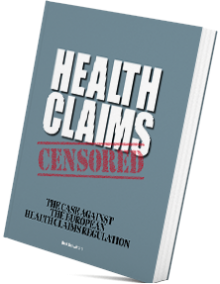Christel Schaldemose, a socialist member of the European Parliament, is quoted as having stated: “We just don’t want to give them this additional thing so they can earn a lot of money on a health claim that we think is not suited for young kids.” By “them,” she meant manufacturers of energy drinks. By “this additional thing,” she meant health claims concerning the beneficial effects of caffeine. [i] These claims and their conditions of use have been approved by the European Food Safety Authority (EFSA), the European Commission and the Standing Committee on Plants, Animals, Food and Feed. [ii]
The “caffeine claims” are claims other than those referring to children’s development and health. They fall under Article 13.3 of the Nutrition and Health Claims Regulation (NHCR). So, the caffeine claims do not concern the “young kids” that Schaldemose seeks to protect. For 2 of the 4 caffeine claims, the conditions of use expressly state: “The claim may be used only for foods targeting adults performing endurance exercise.” For the other 2 claims, the conditions of use stipulate: “The claim shall not be used for foods targeting children.”
Those who followed this “dossier” know that the caffeine claims and their conditions of use received an exceptional amount of care, consideration and attention from EFSA, the Commission and the representatives of the Member States in the Standing Committee. In this context, EFSA even performed a somewhat unusual safety assessment. It determined that, when used as recommended, there were no safety concerns. All this took place under heavy political pressure exerted especially to prevent that “young kids” will become exposed to caffeine claims in commercial communication originating from Schaldemose’s “they.”
However, she and some of her parliamentary colleagues are not satisfied with the outcome of this arduous legislative process. They want to have it their way. To block the use of the claims alltogether, they breathed life into the concept of “profiling nutrients.” This type of profiling is not normally performed by EFSA, since it does not concern a nutrient’s safety. It is a political preoccupation aimed at controlling dietary behaviour by profiling as undesirable the nutrients desired by most of us. In her book The Big Fat Surprise, author Nina Teicholz brilliantly demonstrates what this kind of profiling led to in the case of fat. [iii]
The NHCR provides that health claims shall not be used on products that have an “undesirable” nutrient profile. Since energy drinks usually contain the “undesirable” macronutrient commonly referred to as sugar, the use of caffeine claims could be prohibited if these drinks would be profiled as undesirable in a Commission Regulation that would enforce such a prohibition. Absent such a Regulation, energy drinks do not have an enforceable undesirable profile.
In the turmoil of company bashing and dietary correctness, the regulatory context laid down in EU’s food law is conveniently deleted or ignored. Meaning that what a Member of EU’s parliament “wants” somehow supercedes and makes irrelevant all the existing rules, provisions and regulations that, when followed by food business operators in the production, distribution and marketing of food-products, legitimizethese products. Although these regulations do pose a serious burden to the food industry, their upside is that they also provide protection against arbitrary interference from authorities and self-appointed consumer advocates such as Foodwatch’s Oliver Huizinga. Surfing the anti-energy-drink wave, Huizinga stated “We must put an end to these practices. Companies should not be allowed to use health claims for advertising unhealthy foods.” [iv] To underscore his opinion, he profiled energy drinks as “dangerous energy-bombs” that produce “disastrous health consequences.”
How does what “we” don’t want relate to the facts ? The European Coffee Federation informs us that “Europe has the highest per capita coffee consumption in the world. The EU consumes 2.5 million tons coffee per year, which equates to 4 kilos of roasted coffee per EU inhabitant per year. Every day some 725 million cups of coffee are drunk in the EU.” [v] A normal cup of coffee provides 80mg of caffeine. By way of coffee alone, European consumers ingest 60.000 kilos of caffeine per DAY. That’s 22 million kilos per year.
In addition to this, one cup of tea provides 35mg of caffeine, a glass of “cola” contains 18mg and 30 grams of dark chocolate (1/3rd of a normal bar) provide 14mg of caffeine. The average energy-drink provides 80mg of caffeine, an amount equal to that of a cup of coffee. [vi] In most of these sources, the caffeine comes with sugar. In that respect, energy-drinks are not exceptional. In view of the massive amount of caffeine and sugar ingested by European consumers, the problem posed by excessive consumption of energy-drinks is marginal. It is negligeable compared to smoking, alcohol and drug abuse.
From the perspective of laws and regulations, how does what “we” want relate to the value called “rule of law.” Together with respect for human dignity and human rights, freedom, democracy and equality, the rule of law forms one of the cornerstones on which the European Union was established. [vii] Since a couple of years, the Union’s institutions have begun efforts to come to terms with the value of the rule of law and formulate a definition that is meaningful in the context of the EU.
There seems to arise a political consensus that the essential elements of the rule of law are that “all persons and authorities within the state, whether public or private, should be bound by and entitled to the benefit of laws publicly made, taking effect (generally) in the future and publicly administered in the courts.” This is the definition that was formulated by the eminent British judge and jurist Tom Bingham. [viii] In terms of caffeine, this means that the producers of energy-drinks and their opponents are both bound by the laws that regulate the use of caffeine in food products and the use of health claims espousing their benefits.
Citing his equally British predecessor A.V. Dicey, Bingham clarifies in his book, The Rule of Law, that “[i]f anyone – you or I – is to be penalized it must not be for breaking some rule dreamt up by an ingenious minister or official in order to convict us. It must be for a proven breach of the established law of the land. And it must be a breach established before the ordinary courts of the land, not a tribunal of members picked to do the government’s bidding, lacking the independence and impartiality which are expected of judges.” [ix]
Accepting Bingham’s definition as “most appropriately” covering the essential elements of the rule of law, the European “Venice” Commission for Democracy through Law [x] proposed that it shall be expanded by 8 “ingredients.” According to the Commission, these include: (1) Accessibility of the law (that it be intelligible, clear and predictable); (2) Questions of legal right should be normally decided by law and not discretion; (3) Equality before the law; (4) Power must be exercised lawfully, fairly and reasonably; (5) Human rights must be protected; (6) Means must be provided to resolve disputes without undue cost or delay; (7) Trials must be fair, and (8) Compliance by the state with its obligations in international law as well as in national law. [xi]
In the European Union, commercial communication concerning the beneficial effects of foodstuffs such as caffeine is controlled by the European Commission, the Member States (convening with the Commission in the Standing Committee on Plants, Animals, Food and Feed / Section General Food Law) and the European Parliament. They act as legislators and as “authorities within the state” in the sense that they designed and enacted the applicable rules, and, in these rules, reserved exclusively for themselves the right to reject or authorize what they defined as “health claims.” The commercial entities designated by EU’s legislators as “applicants” may submit and substantiate proposals for health claims, but the “applicants” have no further say in their scientific and political evaluation, their administration and public use.
These rules, laid down in the NHCR and related regulations, were construed to exclude that questions of legal right raised by the commercial communicators should be decided by law and not by discretion. The legislators exclusively and entirely kept the discretion and the law at their side of the fence. In Bingham’s terminology, the NHCR may well be qualified as some rule dreamt up by “ingenious ministers and officials” in order to condemn and discriminate food business operators ahead of having committed a breach of the law of the land, i.e. as guilty for what they are, not for what they did. The NHCR rests on a condemnation by discretion ahead of any trial by law.
The Venice Commission notes that the reconciliation of the rule of law with “discretionary power” began in the middle of the 20th century. “Discretion,” so wrote the Commission, “was accepted, but nevertheless should be constrained by the letter and purpose of the power-conferring law, as well as by other elements of the rule of law, such as that everyone have access to fair procedures before an impartial and independent court, and that the law be applied consistently, equally and in a manner that is not arbitrary or devoid of reason.” [xii]
Clearly, the NHCR is an instrument of discretionary power in the extreme. It is a European Regulation, that lacks all aspects of the “rule of law.” For one thing, by way of this Regulation the European legislature usurped the position, role and competence of “an impartial and independent court.” Still, in line with the Venice Commission’s advice, the application of such self-empowering regulations by the European institutions and, in the case of health claims, the European Food Safety Authority (EFSA), must take place “consistently, equally and in a manner that is not arbitrary or devoid of reason.” In the case of health claims the discretion to reject or authorize their use in commercial communication should be constrained by the “letter and purpose” of the NHCR.
In Recital 1 of the NHCR, the European legislature stated the purpose of the Regulation as follows:
” […] In order to ensure a high level of protection for consumers and to facilitate their choice, products put on the market, including imported products, should be safe and adequately labelled. […]”
Thus, the NHCR extends the European authorities’ discretionary power from protecting consumers against misleading information to facilitating their choices. What “facilitating their choice” really means was explicated in the Impact Assessment that accompanied the European Commission’s 2003 proposal for the NHCR, where the Commission the objective of the NHCR as follows:
“[b]y adopting rules that regulate the information about the foodstuffs and their nutritional value appearing on the label, the consumers will be able to make informed and meaningful choices. This also contributes to a higher level of protection of human health.Appropriate labelling can indeed point consumers in the right direction towards adopting a healthy diet, and facilitate positive and informed choice. Through education, information, health promotion initiatives, as well as through appropriate legislation we can act to help diminish the health risk factors affecting the European public and improve overall quality of life.” (emphasis added) [xiii]
Many of the European legislators, consumer advocates and “watchers” of the food industry would love to adopt “appropriate legislation” to point consumers in what they consider to be the “right direction towards adopting a healthy diet.” Unfortunately for them, they may only point consumers in the “right direction” by way of educational programs and promotion initiatives. “Appropriate legislation” that gives the “pointing” the force of law is out of the question. Article 168 of the Treaty on the Functioning of the European Union prohibits the European institutions from “legislating” matters of public health. Influencing dietary choice and pointing consumers in the healthy direction is strictly off-limits for EU’s legislators.
As stated in Recital 1, the NHCR strictly limits the discretionary legislative powers to providing a high level of protection for consumers by organizing that food products put on the market should be safe and adequately labelled. Facilitating consumers’ choices shall not exceed the contours of a product’s label and the limitations placed on determining what information the labels shall or shall not contain. Hence, labels and other forms of product-related communication are strictly off-limits for European legislators who would like to use them to “point consumers in the right direction towards adopting a healthy diet.”
What may and what may not be regulated in terms of label-content is precisely enumerated in the Food Information Regulation 1169/2011/EU. [xiv] In Article 4, that Regulation stipulates that where mandatory food information is required by food information law, it shall concern information that falls, in particular, into one of the following categories:
“(a) information on the identity and composition, properties or other characteristics of the food;
(b) information on the protection of consumers’ health and the safe use of a food. In particular, it shall concern information on:
(i) compositional attributes that may be harmful to the health of certain groups of consumers;
(ii) durability, storage and safe use;
(iii) the health impact, including the risks and consequences related to harmful and hazardous consumption of a food;
(c) information on nutritional characteristics so as to enable consumers, including those with special dietary requirements, to make informed choices.”
Although Article 4 of the Regulation also provides that, “when considering the need for mandatory food information and to enable consumers to make informed choices, account shall be taken of a widespread need on the part of the majority of consumers for certain information to which they attach significant value or of any generally accepted benefits to the consumer,” this paragraph does not permit the legislature to go beyond the limitations set in the same Article. Besides that, Article 148 of the Treaty prohibits that public health type information to which the majority of consumers attach significant value or that is of any generally accepted benefits to the consumer shall not be part of “food information” mandated by the European authorities.
The “profiling” of nutrients is an activity that concerns public health. In Recital 12 of the NHCR, the legislature unmistakably stated that “the establishment of nutrient profiles should take into account the content of different nutrients and substances with a nutritional or physiological effect, in particular those such as fat, saturated fat, trans-fatty acids, salt/sodium and sugars, excessive intakes of which in the overall diet are not recommended, as well as poly- and mono-unsaturated fats, available carbohydrates other than sugars, vitamins, minerals, protein and fibre.” (emphasis added)
Profiling nutrients entails explicit or implicit recommendations concerning their intakes. In paragraph 1 of Article 168 of the Treaty, such activities are described as “health information and education.” Paragraph 5 does allow the European legislature to “adopt incentive measures designed to protect and improve human health […],” but explicitly excludes that such measures take the form of “any harmonisation of the laws and regulations of the Member States.”
The NHCR harmonizes differences between national provisions relating to nutrition and health claims. This excludes that the Regulation shall contain any public health type measure that is designed to protect and improve human health. Therefore, dietary recommendations concerning excessive or undesirable intakes of nutrients and substances with a nutritional or physiological effect have no place in acts that harmonize national laws and provisions. They have no place in the NHCR. Neither shall the Regulation entail acts based on or related to dietary recommendations.
This viewpoint finds confirmation in the NHCR. In Recital 4, “dietary guidelines or advice issued by public health authorities and bodies” are qualified as “non-commercial communications.” Non-commercial communication – such as the aforementiond guidelines or advice – falls outside the scope and field of application of the NHCR. The profiling of nutrients excessive intakes of which in the overall diet are not recommended squarely falls within the framework of issuing of dietary guidelines or advice. In setting nutrient profiles in the form of an “amendment” to the NHCR, the Commission would create an illegal legal instrument that would overrule and usurp the competence of the Member States’ public health authorities.
Article 168 of the Treaty and the Food Information Regulation clearly prohibit the European legislature from doing what it overconfidently announced in Article 4.1 of the NHCR:
“By 19 January 2009, the Commission shall establish specific nutrient profiles, including exemptions, which food or certain categories of food must comply with in order to bear nutrition or health claims and the conditions for the use of nutrition or health claims for foods or categories of foods with respect to the nutrient profiles. Such measures, designed to amend non-essential elements of this Regulation by supplementing it, shall be adopted in accordance with the regulatory procedure with scrutiny referred to in Article 25(3).”
In Article 4 paragraph 1 of the Treaty on European Union , “competences not conferred upon the Union in the Treaties remain with the Member States.” In paragraph 2 of Article 5, the Member States determined that “under the principle of conferral, the Union shall act only within the limits of the competences conferred upon it by the Member States in the Treaties to attain the objectives set out therein.”
The Member States did not confer upon the Union the competence to undertake legislative action in the field of public health, in casu, in the field of dietary guidelines or advice. If the Union is going to profile nutrients, it may do so only to complement national policies. Such an action may not have the form of a Regulation that harmonizes and thereby replaces national policies and competences.
In the context of consumer behaviour, the profiling of energy-drinks to prohibit the use of health claims and thereby influence dietary behaviour is a futile and counter-productive effort. It’s a total waste of energy. In terms of public health, it will have the effect of a drop in the ocean. In terms of bothering producers of energy-drinks, allowing the voluntary caffeine claims for energy-drinks will force producers who use the claims to accompany them by the conditions of use that may very well limit sales to children and young adolescents. Prohibiting the use of caffeine claims implies a prohibition of their conditions of use. Thus, more is lost than gained.
Other than this, the pro-profilers should seriously consider that the profiling of nutrients by way of a Commission Regulation that will amend the NHCR may very well vaporize when brought in contact with the European Treaties and European food law.
Bert Schwitters
[i] http://www.nutraingredients.com/Regulation-Policy/MEPs-brew-final-caffeine-claims-battle-as-approval-beckons
[ii] Summary Report of the Standing Committee on Plants, Animals, Food and Feed; Brussels; Section General Food Law; Point B.07; 12 April 2016; sante.ddg2.g.5(2016)2527400
[iii] http://thebigfatsurprise.com/
[iv] http://www.nutraingredients.com; Consumer group calls on Monster-Energy to stop using claims on its dangerous “caffeine-bombs.”
[v] http://www.ecf-coffee.org/about-coffee/coffee-consumption-in-europe
[vi] http://www.voedingscentrum.nl/encyclopedie/cafeine.aspx
[vii] Article 2 of the Consolidated Version of the Treaty on European Union.
[viii] Tom Bingham served as Master of the Rolls, Lord Chief Justice and asSenior Law Lord. After retiring from HM judiciary in 2008, Lord Bingham focused on teaching and lecturing in human rights law. His book on the the rule of law was published in 2010 and posthumously won the 2011 Orwell Prize for Literature. The British Institute of International and Comparative Law named the bingham centre for the rule of law in his honour. (Source: Wikipedia)
[ix] the rule of law; Tom Bingham; Penguin Group; 2010.
[x] Venice Commission; Report of the Rule of Law; Paragraph IV; 25-26 March 2011
[xi] Venice Commission; Report of the Rule of Law; Paragraph IV-37; 25-26 March 2011.
[xii] Venice Commission; Report of the Rule of Law; Paragraph II-12; 25-26 March 2011.
[xiii] Paragraph 12 in the Proposal for a Regulation on nutrition and health claims made on foods; Brussels, 16.7.2003 COM(2003) 424 final; 2003/0165 (COD) (presented by the Commission).
[xiv] Regulation No 1169/2011 of 25 October 2011 on the provision of food information to consumers, amending Regulations (EC) No 1924/2006 and (EC) No 1925/2006 of the European Parliament and of the Council, and repealing Commission Directive 87/250/EEC, Council Directive 90/496/EEC, Commission Directive 1999/10/EC, Directive 2000/13/EC of the European Parliament and of the Council, Commission Directives 2002/67/EC and 2008/5/EC and Commission Regulation (EC) No 608/2004.




